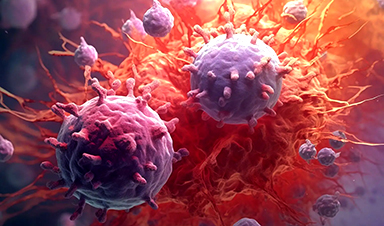Incorporating a personalized mRNA vaccine, designed to match an individual’s tumor genetics, into standard immunotherapy substantially boosts survival rates and reduces the recurrence of high-risk skin cancers in patients who have had these malignancies removed.
Global trials that could revolutionize cancer treatment and save countless lives are being led by scientists from Edith Cowan University (ECU).
Clinical Professor Adnan Khattak from ECU’s Centre for Precision Health recently unveiled the newest findings from these trials at the 2023 American Society of Oncology (ASCO) congress in Chicago. The ASCO congress, attracting more than 45,000 participants, is the largest cancer treatment conference worldwide.
After 18 months, cancer-free survival among patients who received the vaccine and the immunotherapy treatment was 78.6 percent, compared to 62.2 percent of those who only received the immunotherapy.
Two years after treatment, only 22.4 percent of patients who had received the vaccine/immunotherapy combination had either died or seen a recurrence of the disease, which rose to 40 percent for the immunotherapy-only group.
Overall, after an average of two years, those who received the vaccine saw a 44 percent lower risk of death or melanoma returning to the same area of the body, and a 65 percent reduction in the risk of death or the cancer returning in a different area of the body.
Crucially, there was no significant increase in rates of adverse side effects.
Professor Khattak said the trial began as a way of trying to address the shortcomings of current treatments.
“The current standard of care is immunotherapy using an antibody known as pembrolizumab,” he said.
“There are two main issues: first, despite having active immunotherapy for stage three melanoma, about half of the patients will relapse at five years.
“And secondly, it’s a very crude approach: currently if I treat 10 new high-risk melanoma patients, I give them the same drug; it’s not rocket science that it’s going to work for some but not others, and some may see side effects and others may not.
“This is the biggest trial to show treatment improves with an individualized approach — and I think research into personal cancer vaccines is going to increase dramatically after this positive study.”
Getting to know you — and your disease
Though vaccines are typically associated with disease prevention, in this instance the mRNA vaccine is used to treat people who have already been diagnosed with melanoma.
Samples of tissue are taken and analyzed to identify neoantigens, proteins that form on cancer cells, and which are unique to an individual’s tumor.
Up to 34 neoantigens may be identified, which are then added to an mRNA molecule and added to a vaccine.
The result is a personalized cancer treatment, with the neoantigens most likely to develop an immune response to help the patient’s body fight cancer.
Professor Khattak said it appeared to be more effective after an extended period of time and required multiple doses.
“In this study, the survival rate between the two groups is the same after 40 weeks, so early relapses happen for both,” he said.
“Some patients have fairly resistant tumors that aren’t going to respond to either of the treatments.
“But after the first 40 weeks, by then the patients have had two or three vaccine doses and the anti-tumor effect really kicks in.
“We see quite a significant proportion of patients relapsing after they finish pembrolizumab, whereas we’re not seeing such late relapses in patients who have done the double treatment because in addition to pembrolizumab, the effect of the vaccine kicks in with a much stronger anti-tumor immune response.”
Next steps
Professor Khattak will soon lead a new global trial of the treatment,
His clinic in Perth, Western Australia recruited the most participants of any site in the world.
“I would like to thank all my patients who took part in this research at a difficult point in their life,” Professor Khattak said.
The new trial will include more participants, some with earlier stages of melanoma.
“Stage two and stage three patients combined constitute quite a significant proportion of patients who could be potentially cured, rather than waiting for them to develop metastatic or advanced disease where most of them will not be curable,” he said.
If successful, the trial could be the starting point of a new approach to cancer treatment, beyond just melanoma.
“This is going to be the stepping stone for a number of trials,” Professor Khattak said.
“Because now they have expanded it into lung cancer, kidney cancers, and also into gastrointestinal cancers.
“This has the potential of becoming a new standard of care moving forward.”
Meeting: 2023 American Society of Oncology
Those looking for details on the trial can contact One Clinical Research.
The research was funded by Moderna, Merck Sharp and Dohme.
News
Scientists reveal how exercise protects the brain from Alzheimer’s
Researchers at UC San Francisco have identified a biological process that may explain why exercise sharpens thinking and memory. Their findings suggest that physical activity strengthens the brain's built in defense system, helping protect [...]
NanoMedical Brain/Cloud Interface – Explorations and Implications. A new book from Frank Boehm
New book from Frank Boehm, NanoappsMedical Inc Founder: This book explores the future hypothetical possibility that the cerebral cortex of the human brain might be seamlessly, safely, and securely connected with the Cloud via [...]
Deadly Pancreatic Cancer Found To “Wire Itself” Into the Body’s Nerves
A newly discovered link between pancreatic cancer and neural signaling reveals a promising drug target that slows tumor growth by blocking glutamate uptake. Pancreatic cancer is among the most deadly cancers, and scientists are [...]
This Simple Brain Exercise May Protect Against Dementia for 20 Years
A long-running study following thousands of older adults suggests that a relatively brief period of targeted brain training may have effects that last decades. Starting in the late 1990s, close to 3,000 older adults [...]
Scientists Crack a 50-Year Tissue Mystery With Major Cancer Implications
Researchers have resolved a 50-year-old scientific mystery by identifying the molecular mechanism that allows tissues to regenerate after severe damage. The discovery could help guide future treatments aimed at reducing the risk of cancer [...]
This New Blood Test Can Detect Cancer Before Tumors Appear
A new CRISPR-powered light sensor can detect the faintest whispers of cancer in a single drop of blood. Scientists have created an advanced light-based sensor capable of identifying extremely small amounts of cancer biomarkers [...]
Blindness Breakthrough? This Snail Regrows Eyes in 30 Days
A snail that regrows its eyes may hold the genetic clues to restoring human sight. Human eyes are intricate organs that cannot regrow once damaged. Surprisingly, they share key structural features with the eyes [...]
This Is Why the Same Virus Hits People So Differently
Scientists have mapped how genetics and life experiences leave lasting epigenetic marks on immune cells. The discovery helps explain why people respond so differently to the same infections and could lead to more personalized [...]
Rejuvenating neurons restores learning and memory in mice
EPFL scientists report that briefly switching on three “reprogramming” genes in a small set of memory-trace neurons restored memory in aged mice and in mouse models of Alzheimer’s disease to level of healthy young [...]
New book from Nanoappsmedical Inc. – Global Health Care Equivalency
A new book by Frank Boehm, NanoappsMedical Inc. Founder. This groundbreaking volume explores the vision of a Global Health Care Equivalency (GHCE) system powered by artificial intelligence and quantum computing technologies, operating on secure [...]
New Molecule Blocks Deadliest Brain Cancer at Its Genetic Root
Researchers have identified a molecule that disrupts a critical gene in glioblastoma. Scientists at the UVA Comprehensive Cancer Center say they have found a small molecule that can shut down a gene tied to glioblastoma, a [...]
Scientists Finally Solve a 30-Year-Old Cancer Mystery Hidden in Rye Pollen
Nearly 30 years after rye pollen molecules were shown to slow tumor growth in animals, scientists have finally determined their exact three-dimensional structures. Nearly 30 years ago, researchers noticed something surprising in rye pollen: [...]
How lipid nanoparticles carrying vaccines release their cargo
A study from FAU has shown that lipid nanoparticles restructure their membrane significantly after being absorbed into a cell and ending up in an acidic environment. Vaccines and other medicines are often packed in [...]
New book from NanoappsMedical Inc – Molecular Manufacturing: The Future of Nanomedicine
This book explores the revolutionary potential of atomically precise manufacturing technologies to transform global healthcare, as well as practically every other sector across society. This forward-thinking volume examines how envisaged Factory@Home systems might enable the cost-effective [...]
A Virus Designed in the Lab Could Help Defeat Antibiotic Resistance
Scientists can now design bacteria-killing viruses from DNA, opening a faster path to fighting superbugs. Bacteriophages have been used as treatments for bacterial infections for more than a century. Interest in these viruses is rising [...]
Sleep Deprivation Triggers a Strange Brain Cleanup
When you don’t sleep enough, your brain may clean itself at the exact moment you need it to think. Most people recognize the sensation. After a night of inadequate sleep, staying focused becomes harder [...]





















